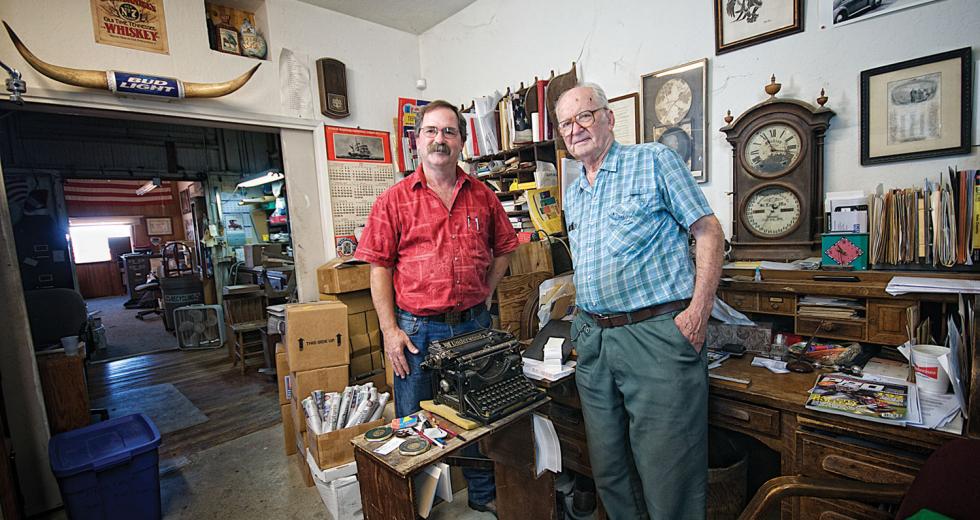Newspapers across the nation have been in a painful freefall for the past couple of years, cutting budgets, pages and staff nearly as quickly as they can relay information. The culprit, of course, is a lackluster economy that has severely hindered advertising revenue piggybacked on a readership that’s demanding free content in new mediums. So it comes with a few raised eyebrows to find Winters Express, a small weekly, still plodding along.
“We are treading water, but we are making money. Foreclosure notices are carrying us right now,” says publisher Charles Wallace. “My goal is not to lose money. I have never lost money.”
To keep his numbers in the black this year, Wallace will raise the price of his newspapers from 50 cents to 75 cents. It’s a change he hopes will force costly out-of-town subscribers to rely on the company’s website instead, thus saving the Winters Express from the cost of pricey deliveries. Web subscriptions are $20 a year.
“Winters is a small town, but has grown a little bit over the past two years, and [2007] was the Winters Express’ best year ever in the face of everyone else,” says publisher Foy McNaughton, President and CEO of parent company McNaughton Newspapers.
The trend earned publisher Charles Wallace the eight-paper group’s Editor of the Year award and the attention of other newspapers across the state.
Founded in 1884 by long-passed Ed Rust, the 20-page Winters Express has been held close to the hearts of the Wallace family since Newton Wallace purchased the broadsheet in 1947.
“I was 26 when I bought the paper. I figured I would pay it off, sell it, and buy a bigger paper elsewhere. But by the time I got it paid off, I liked Winters,” says the now 89-year-old newsman.
It was plug-and-chug for decades, until Newt decided he wanted to back off and let his son, Charlie, join the ranks. Charlie made the leap from typewriter to an ATT 6300 computer and sought a third-party printer so his father could stop typesetting by hand. He added a pool table and a keg fridge, a busted hot tub and a part-time staff.
But the 1980s were hard times in Winters, not unlike those of today, and the years saw the closing of the Chrysler car dealership and the town’s two department stores, among others.
“The economic base to keep the paper running just wasn’t there. We were just breaking even,” Charlie says. “We never really recovered from the ’89 recession. The business district had just disappeared, and in 1993 we decided to find a partner.”
The paper, now partnered with McNaughton, is in its 126th year. It has 2,350 print subscribers and online content comes with a price, which a number of readers and industry pundits have scoffed at.
“Our reporters are good, well-trained and spend hours creating great stories,” McNaughton says. “We spend a lot of money to do that right, and we charge people to read it. Why would I treat a story as something of no value? I’m the only one in California doing this, but if you give your content away free you will drive your print circulation right down the drain. It’s the right model, and we think we’re going to make it. We haven’t been impacted on by falling print subscriptions like the [Sacramento] Bee or the [San Francisco] Chronicle.”
But while online subscription revenue is bolstering McNaughton’s bottom line, he says none of his publications are exactly “thriving” right now. “But we’ve hunkered down, and we don’t have any debt,” he says, “so we can just wait for the economy to turn around.”
Recommended For You

#YOLO
The 7 best bike rides in Yolo County
Lovely scenery along gently rolling foothills has always made Yolo County an ideal place for cyclists, but who knew everyone took it so seriously?

Green Grids
Transportation reforms throughout the region are changing the ways people live and travel in Yolo County
It’s been a year since Gov. Jerry Brown signed legislation that created the Active Transportation Program to boost non-motorized transportation across the state, where one in four Californians are obese and more than 3.9 million are diabetic. And as California emerges as a national leader in transportation reform, Yolo County is finding itself at the forefront of the movement.



